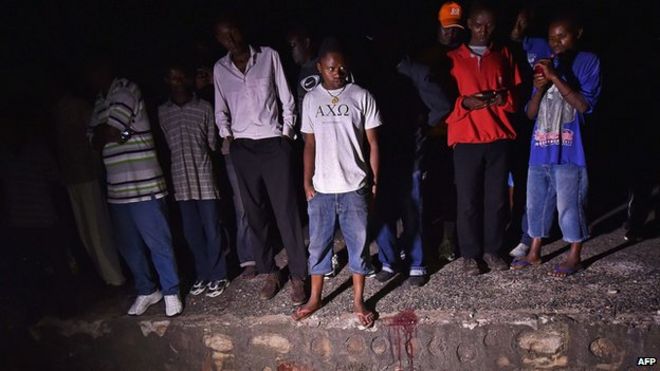Burundi opposition figure Zedi Feruzi shot dead
- 23 May 2015
- Africa

The leader of a small Burundian opposition party has been shot dead in the capital Bujumbura, witnesses said, as tensions continue in the country.
The body of Zedi Feruzi, the head of the Union for Peace and Development, was seen lying outside his home.
Burundi has seen weeks of protest against President Pierre Nkurunziza's decision to run for a third term.
Demonstrators are holding a two-day truce, to allow residents to stock up on supplies and bury the dead.
On Friday, at least two people were killed in a grenade attack in Bujumbura.
The unrest has also seen more than 100,000 people flee to neighbouring countries and a failed coup attempt against Mr Nkurunziza.
Burundi /bəˈrʊndɨ/ or /bəˈrʌndi/, officially theRepublic of Burundi (Kirundi: Republika y'Uburundi, [buˈɾundi]; French: République du Burundi, [byˈʁyndi]), is a landlocked country in the African Great Lakes region of Southeast Africa, bordered by Rwanda to the north, Tanzania to the east and south, and the Democratic Republic of the Congo to the west. It is also sometimes considered part of Central Africa. Burundi's capital is Bujumbura. Although the country is landlocked, much of the southwestern border is adjacent to Lake Tanganyika.
The Twa, Hutu and Tutsi peoples have lived in Burundi for at least five hundred years. For more than 200 years, Burundi had an indigenous kingdom. At the beginning of the twentieth century, Germany colonized the region. After the First World War and its defeat, it ceded the territory to Belgium. The latter ruled Burundi and Rwanda as a European colony known as Ruanda-Urundi. Their intervention exacerbated social differences between the Tutsi and Hutu, which contributed to political unrest in the region. There was civil war in Burundi as it fought for independence in the middle of the twentieth century. Presently, Burundi is governed as a presidential representative democratic republic.
Burundi is one of the five poorest countries in the world. It has one of the lowest per capita GDPs of any nation in the world. The country has suffered from warfare, corruption and poor access to education. Burundi is densely populated and has had substantial emigration as young people seek opportunities elsewhere. According to a 2012 DHL Global Connectedness Index, Burundi is the least globalized of 140 surveyed countries.
According to the Global Hunger Index of 2013, Burundi has an indicator ratio of 38.8, earning the nation the distinction of being the hungriest country in the world in terms of percentage.
No comments:
Post a Comment